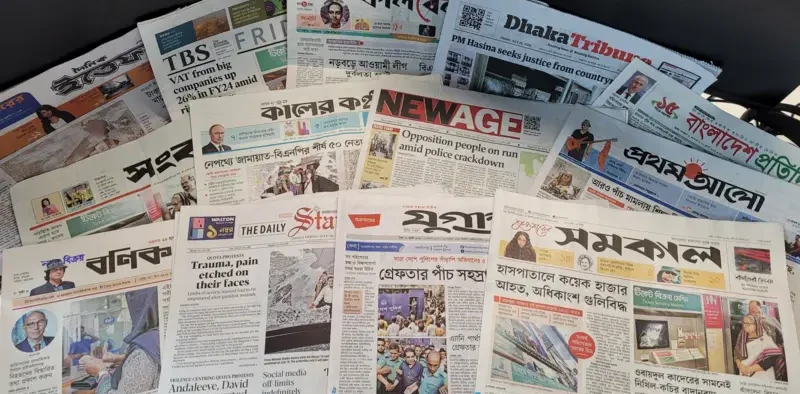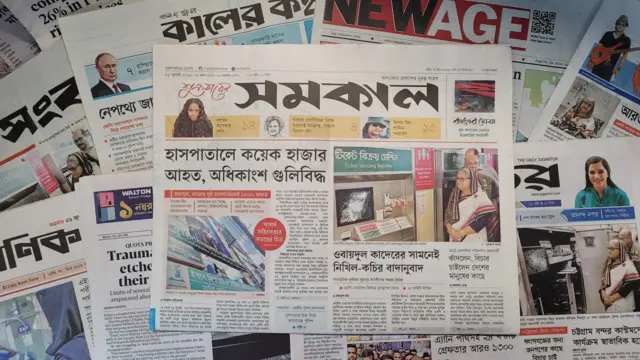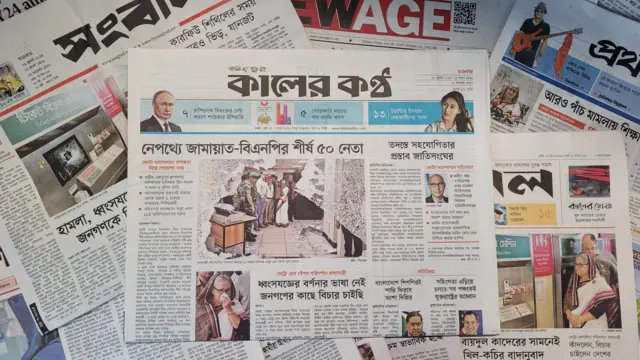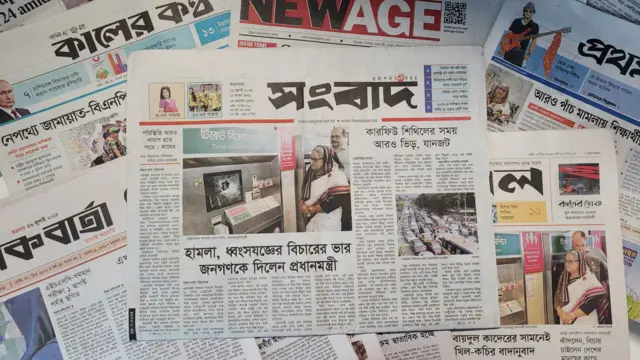‘UN concerned over direct fire by security forces’

On the issue of security forces firing, Naya Diganta’s main headline, ‘ UN concerned over direct fire by security forces ‘.
According to the report, the United Nations has expressed deep concern over the use of direct fire by the security forces in recent incidents in Bangladesh. They expressed this concern through a statement.
Similarly, Bangladesh authorities in Dhaka and New York have been directly informed about this concern.
United Nations Secretary-General’s spokesperson Stephen Dujarric responded to a question while participating in a regular press briefing in New York on Thursday.
Meanwhile, UN human rights chief Volker Turk called on the Bangladesh government to urgently release detailed information on the crackdown on protesters.
According to international law, the government must immediately restore full internet access for all people, including journalists and media, to communicate freely, the statement said.
Law enforcement agencies must uphold international human rights principles and standards, the statement said.
Banir Barta front page news on international organizations’ concern over violence surrounding quota reform movement ” UN High Commissioner for Human Rights: Release details of casualties “
According to the report, United Nations High Commissioner for Human Rights Falker Turk urged the government to urgently disclose the details of those killed, injured and detained in the clashes that have been going on for several days surrounding the quota reform movement in Bangladesh.
At the same time, he also urged to ensure that all the operations of law and order forces comply with international human rights norms and standards.
This call was made in a press release published on Thursday.
Volker Turk said, ‘Bangladesh government should urgently disclose the details of the incident that has been going on for the past one week.
According to the latest reports we have, 170 people have been killed and over 1,000 injured. Many others did not receive treatment.
Many people have gone missing during this movement of students and youth against the policies of the government. At least two journalists were killed and several were injured.
More than 100 people including opposition leaders and activists have been detained. Many people were attacked by government supporters, but no effort was made to protect them.

‘ Thousands injured in hospital, most shot ‘ , headlines of the day depicted the violence surrounding the quota reform movement.
According to the report, hundreds of thousands of injured persons were taken to different hospitals in Dhaka during the last four days from 18th to 21st July.
Among them were men, women and children of all ages. Most of them were shot. Bullets and shrapnel were the two types of bullets in the body of the injured.
Majority of the victims were bullet victims. Most of those who came for treatment on July 19-20 were bullet-ridden.
As of Thursday (July 25), more than a thousand injured people were undergoing treatment in various public and private hospitals in Dhaka.
After checking the hospitals around Jatrabari-Shanir Akhra, Uttara-Abdullahpur, Rampura-Bada and Mohammadpur-Basila areas of Dhaka, it is known that from July 18 to 20, about 4,000 people received treatment.
Meanwhile, the report mentions that the body of the deceased is being buried without an autopsy.
On the issue of security forces firing, Naya Diganta’s main headline, ‘ UN concerned over direct fire by security forces ‘.
According to the report, the United Nations has expressed deep concern over the use of direct fire by the security forces in recent incidents in Bangladesh. They expressed this concern through a statement.
Similarly, Bangladesh authorities in Dhaka and New York have been directly informed about this concern.
United Nations Secretary-General’s spokesperson Stephen Dujarric responded to a question while participating in a regular press briefing in New York on Thursday.
Meanwhile, UN human rights chief Volker Turk called on the Bangladesh government to urgently release detailed information on the crackdown on protesters.
According to international law, the government must immediately restore full internet access for all people, including journalists and media, to communicate freely, the statement said.
Law enforcement agencies must uphold international human rights principles and standards, the statement said.
Banir Barta front page news on international organizations’ concern over violence surrounding quota reform movement ” UN High Commissioner for Human Rights: Release details of casualties “
According to the report, United Nations High Commissioner for Human Rights Falker Turk urged the government to urgently disclose the details of those killed, injured and detained in the clashes that have been going on for several days surrounding the quota reform movement in Bangladesh.
At the same time, he also urged to ensure that all the operations of law and order forces comply with international human rights norms and standards.
This call was made in a press release published on Thursday.
Volker Turk said, ‘Bangladesh government should urgently disclose the details of the incident that has been going on for the past one week.
According to the latest reports we have, 170 people have been killed and over 1,000 injured. Many others did not receive treatment.
Many people have gone missing during this movement of students and youth against the policies of the government. At least two journalists were killed and several were injured.
More than 100 people including opposition leaders and activists have been detained. Many people were attacked by government supporters, but no effort was made to protect them.

‘ Thousands injured in hospital, most shot ‘ , headlines of the day depicted the violence surrounding the quota reform movement.
According to the report, hundreds of thousands of injured persons were taken to different hospitals in Dhaka during the last four days from 18th to 21st July.
Among them were men, women and children of all ages. Most of them were shot. Bullets and shrapnel were the two types of bullets in the body of the injured.
Majority of the victims were bullet victims. Most of those who came for treatment on July 19-20 were bullet-ridden.
As of Thursday (July 25), more than a thousand injured people were undergoing treatment in various public and private hospitals in Dhaka.
After checking the hospitals around Jatrabari-Shanir Akhra, Uttara-Abdullahpur, Rampura-Bada and Mohammadpur-Basila areas of Dhaka, it is known that from July 18 to 20, about 4,000 people received treatment.
Meanwhile, the report mentions that the body of the deceased is being buried without an autopsy.
The main headline of the merchant message about the disaster in the banking sector is, ‘ Huge amounts of cash in the hands of the people are running on the banks of the central bank ‘.
According to the report, the demand for cash in the country’s banking sector has intensified. Bangladesh Bank continues to print new money to deal with the situation.
According to the data of the Central Bank, the amount of notes issued in the country on June 20 stood at 3 lakh 27 thousand 563 crores.
The country has never seen such amount of notes issued before. 95 percent of the notes issued have gone out of the banking sector.
Nowadays people tend to hold cash for no occasion. Because the lack of trust of customers towards the bank has intensified.
Almost all official means of money transactions, including banks, were closed for five consecutive days due to the conflict in the country during the last week centered on the quota reform movement.
Many banks in the country were unable to meet the cash demands of customers on Wednesday. That is why so much money has to be borrowed from the central bank.

The main headline of Kal Kanth regarding the intelligence about sabotage, ‘ Top 50 leaders of Jamaat-BNP behind the scenes ‘.
According to the report, the detectives have named more than half a hundred top level leaders of Jamaat-BNP among the planners of sabotage around the quota reform movement.
They planned to attack the Dhaka Central Jail. Their main targets were important state installations. Dhaka Central Jail, Awami League Central Office in Dhanmondi and Dhaka University were on the special list.
At this stage of the investigation, the Intelligence Branch (DB) of the Dhaka Metropolitan Police has learned that the top level leaders of Jamaat-Shibir were behind these attacks, sabotage and violence.
DB sources say that Jamaat-BNP and conspirator top leaders held several meetings with the central leaders of BNP before the sabotage.
BNP leaders have supported them behind the scenes. In this regard, the names of more than half a hundred top level leaders of Jamaat-BNP have been listed.
Apart from this, 64 emirs of different district levels and several thousand top leaders of Shibir have been listed under arrest.

The main headline of the news about the Prime Minister’s inspection of the situation of the Metrorail, ‘ Prime Minister gives the burden of justice to the people of attack, destruction ‘.
The Prime Minister visited the metro rail station at Mirpur-10 on Thursday morning and told the journalists in an emotional voice, ‘The people of the country must judge them. I want justice from the people. I have no words to describe the devastation.’
He also urged those who capitalized on the quota movement to wreak havoc.
The head of government said, ‘You have to stand against those who created the suffering that I wanted to alleviate.’
Earlier he visited the affected metro rail station. He looked around the entire station.
Various places including CCTV cameras, LED monitors, ticket cutting machines were vandalized in the metro station. Many valuable things were looted.
BBC BANGLA











